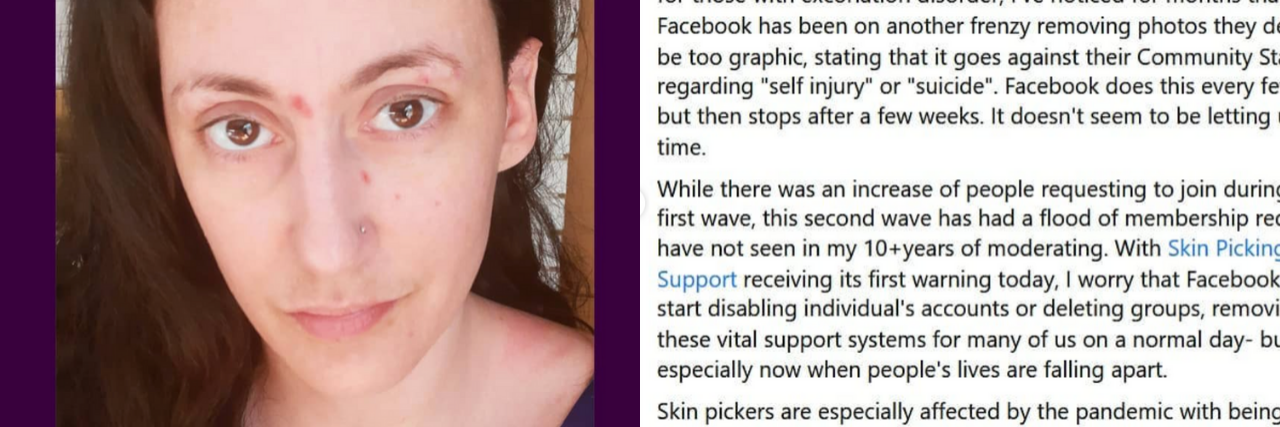Excoriation disorder, aka dermatillomania, is a psychological disorder that manifests through an overwhelming urge to pick at one’s own skin to the extent that damage is caused. People who pick at their skin are not doing it because they want to create marks on their skin; they cannot stop this compulsive behavior without various interventions, supports or therapy.
In the past few months, Facebook has been detecting images of damaged skin in its groups and automatically removing them for violating Community Standards of depicting “self injury” or “suicide,” both which dermatillomania is not related to. Although the result of excoriation disorder is damage to the skin, the intention behind the urge is to fix a real or perceived imperfection while getting relief from anxiety through the behavior.
There is no option to contest Facebook’s ruling other than to delete, mute or block the person who made the original post. The photo isn’t shown to group moderators, which makes it difficult for us to know what is being censored. When members join a forum about skin picking, they know that the nature of this disorder includes the harsh realities of blood, pus, scabbing and scars because they also experience shame and embarrassment first-hand from the marks it leaves behind. If it’s too triggering for some to see the images, there is an option to unfollow the group from their feed. For many others, scrolling through images of other people’s struggles is what makes them feel less alone and ashamed of their condition.
View this post on Instagram
After I publicly expressed my frustration toward Facebook for deleting images, I came across the article “Borderline Personality Disorder Community Tells Instagram to ‘Stop Silencing Us” and am more alarmed at how both platforms, owned by the same company, are restricting content due to the stigmatizing nature of these mental health conditions. As someone who was also diagnosed with BPD years ago, this is a double-whammy to know our voices, faces and diagnoses are being erased from social media platforms in misguided efforts to avoid possible liability in case someone’s life is in danger.
If they wanted to improve their understanding of body-focused repetitive behaviors (BFRBs), they would allow us the space to interact with others so we can heal from the psychological and physical damage this isolating affliction causes. If they want to improve their response to BFRB-related content, they could always include organizations like the TLC Foundation for BFRBs in their round table of professionals who help create its rules to ensure that we aren’t being further discriminated against.
Members of Facebook’s BFRB forums don’t encourage each other to engage in the behavior or offer tips on how to make it worse. They look to be accepted alongside a supportive group of individuals who understand the multi-faceted struggles of a disorder that is still dismissed by many health professionals. This includes showing our skin to a world that doesn’t accept the types of imperfections we have with its ideal — and unrealistic — standards of beauty, especially regarding flawless skin.
Facebook is further promoting the idea that our appearance is unacceptable for their platform, which spreads the message that our bodies are offensive in the general public. Although our photos can be deleted, our existence in the real world cannot be erased. Our faces don’t appear with a trigger warning, nor do we need one for looking how we do or for being unapologetic in who we are.
Tell Facebook #ipickmyskin by sharing a photo of yourself with your marks. Let them know that you refuse to cover-up or be silenced for having a disorder you never asked for. Never be ashamed for the condition of your skin.

